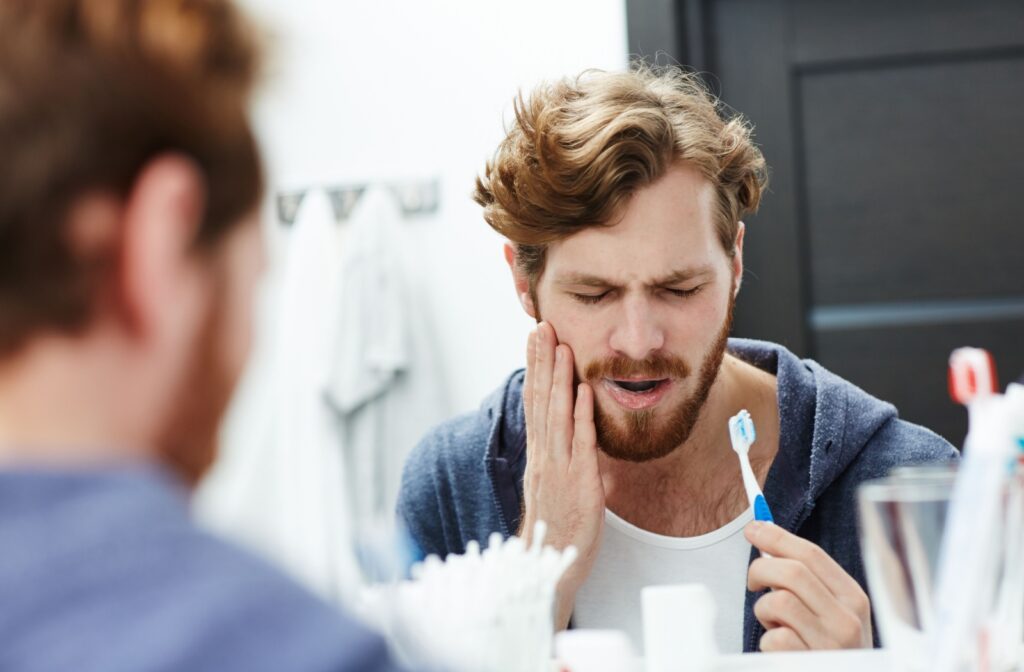Brushing your teeth is a daily routine. Most people follow it without thought—after all, we all learned it from a young age! However, regular brushing is key to maintaining a healthy smile. But what if this habit could be done to excess, eventually leading to oral health issues?
You can brush your teeth too much, and it can harm your teeth if you aren’t careful. Overbrushing can lead to problems such as enamel wear and gum damage, especially if you apply significant pressure. You should be gentle when brushing—let your toothbrush do most of the work.
Why Is Brushing Your Teeth So Important?
Brushing your teeth is essential. It’s not about appearance—though it does help with this, too. Instead, brushing is about removing plaque, the sticky film that forms on your teeth.
Your mouth naturally has a complex biosystem made up of plenty of bacteria. These bacteria are natural. However, when you consume certain foods and sugars, these bacteria produce acids that can damage the protective enamel of your teeth. Over time, this produces plaque, the root of many oral health issues.
If you don’t remove plaque regularly, it can harden into tartar. Tartar is much more difficult to remove, and often can’t be fixed without the help of a dental professional. Tartar and plaque can damage your teeth and gums, leading to cavities, gum disease, and other oral problems.
Regular brushing helps prevent this buildup in the first place. It keeps your teeth clean, removes bacterial buildup, and dislodges food particles in the mouth. It’s the key to a strong and healthy smile.
Is Overbrushing Your Teeth a Real Thing?
Brushing hard might seem like a thorough approach, but it isn’t harmless. When you brush too hard or too often, you risk wearing down your enamel. This is problematic, as your enamel is essential for shielding your teeth from decay and sensitivity.
Enamel wear can lead to:
- Tooth sensitivity
- Higher risk of cavities
- Gum recession
- Irritation
- Potential inflammation
The protective layer of your teeth can become compromised, which can even lead to changes in tooth colour and appearance. Knowing how to properly brush your teeth is key—it requires a gentle touch and a soft toothbrush.
How to Properly Brush Your Teeth
Properly brushing your teeth makes a significant difference to dental health. But you’ll need to use the right technique to make sure your brushing is effective and not causing you any harm.
Make sure to:
- Hold your toothbrush roughly at a 45-degree angle to your gums.
- Gently move the brush in short, tooth-wide strokes.
- Brush all surfaces of the teeth—outer, inner, and chewing surfaces.
- Spend at least two minutes brushing, twice a day.
- Use a toothbrush with soft bristles and toothpaste with fluoride.
Apply gentle pressure and be thorough. This helps you maintain the cleanliness of your teeth, but without the risk of damaged enamel and gums. Don’t forget to replace your toothbrush every 3-4 months, or sooner if the bristles are frayed.
Tips for Maintaining Oral Health
However, maintaining your oral health involves more than just brushing. A comprehensive oral care plan includes flossing, mouthwash, care, and regular dental visits.
Flossing daily is essential for cleaning between teeth where your toothbrush can’t reach. It helps remove food particles and plaque. This reduces the risk of cavities and gum disease. Mouthwash can also be beneficial, as it helps freshen breath and kill bacteria.
It also helps to:
- Limit sugary and acidic foods
- Drink plenty of water to rinse your mouth
- Avoid tobacco products
- Eat a balanced diet rich in vitamins
And don’t forget to visit your dentist regularly for cleanings and oral assessments to catch any issues early. This approach to oral care helps keep your smile bright, healthy, and strong.
Signs You Should Visit Your Dentist
Sometimes, preventive measures aren’t enough. There may be a point where you need to visit your dentist to find relief from conditions like gum disease, cavities, or any other unusual problem. Keep an eye out for signs that something is wrong, such as:
- Persistent bad breath
- Bleeding gums
- Tooth sensitivity
- Swelling or pain in the gums
- Loose teeth
- Difficulty chewing
If you experience any of these symptoms, schedule an appointment with your dentist. These could be signs of underlying dental issues that need professional attention.
Trust Us With Your Oral Health
Taking care of your teeth is simpler when you have the right guidance. And here at Hometown Dental, we’re happy to offer dental care that’s both effective and gentle. You deserve a healthy and strong smile, and we know how to help. Reach out to our team to schedule your appointment, and let’s work together to keep your smile strong.





